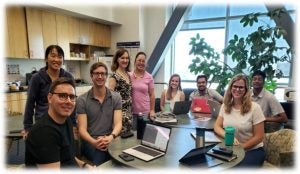
Welcome to the Haczku lab!
We study the effects of environmental exposures (allergen, ozone, cigarette smoke, psychosocial stress and infections) with a focus on how the innate and adaptive immune systems cooperate during development and resolution of airway inflammation. We use lung physiology and pathology to demonstrate the role of lung collectins, IgE-mediated immune mechanisms and psychosocial stress in airway and parenchymal pathologies. Using in vitro ozone exposure systems with airway epithelial cells (both submerged and Air Liquid Interface) we study the expression of IL-33 and TSLP. We also investigate how innate lymphoid and natural killer (NK) cells mediate environmental effects and regulate airway inflammation in mice, rhesus macaques and in asthma patients.
Advice to budding scientist
About curiosity, discipline, humility, communication, creativity, and the joy of conducting research
Curiosity: My late father, a research engineer, once told me that he is perplexed by the fact that thousands of people travel on the electric tram on the streets of Budapest (where we used to live) but they don’t know and don’t care about how it works. (Actually, there is some very cool physics behind how trams work, I recommend that you look it up.) Of course, not everyone are blessed with an inquisitive mind. But if you are a scientist, curiosity has to be always your main driver. Even if you don’t care about how the electric tram works, I advise you to study and understand the basic principles behind all the techniques/equipment and mechanisms that you plan to study and use for your research projects. Your knowledge will save you a lot of time and frustration when it comes to troubleshooting and completing your experiments successfully.
Discipline: To be successful, discipline is crucial not only for the execution, but also for the scientific design and interpretation of your experiments. Biological systems are strongly influenced by a myriad of circumstances. To obtain the right answer to your questions (i.e. to find out “the Truth”), you need to be vigilant and control for everything you can. Always include positive and negative controls, time courses, and dose responses. Consider the number of repeats, and experimental sample sizes (“the n”). Select the correct data analysis and statistical methods. Research requires hard work, but there is no greater satisfaction than seeing that your positive controls turned out to be positive the negative ones negative, and knowing you did everything right.
Humility: Always let your data guide you! There is no such thing as the “experiment didn’t work” (a phrase I often hear from my trainees when I am inquiring about their results during lab meetings). You shouldn’t dismiss failed experiments: Keep careful records of them, document the mistake you made if you know what it was, and conduct painstaking detective work to figure it out step by step, if you don’t. Learn from failed experiments! Remember, if Fleming had tossed his fungus-contaminated cultures, humankind would have never benefited from the discovery of penicillin!
Communication and collaboration: Always sharpen your skills of effective writing and talking by learning to critically read and think. Use meetings, conferences, and symposia to reach out to mentors and like-minded people. Ask how they succeeded in overcoming hurdles, what motivates them every day, and where they get their inspiration and enthusiasm for discovery. Take time to get to know your fellow scientists in the same field. One of the greatest (indeed, addictive) luxuries for me in academic medicine is being surrounded by brilliant minds who make me want to be better at what I do every day.
Creativity and the joy of conducting research: Enjoy experimenting and be creative and imaginative! These are equally essential and interdependent ingredients of good science. Today’s young researchers (and in fact the old ones too) are increasingly confronted by fierce competition and uncertain career prospects in both academia and industry. Stress can erode our imagination and creativity. We may sometimes lose heart and sight of “why we do science in the first place” (The Effective Scientist|Conservationbytes.com). When I am faced with difficulties and success becomes elusive, I always look for inspiration in others. I strongly urge you to seek out role models near and far.
Never forget, we are ultimately here to advance knowledge by discovering something new, and have fun in the process. I wish you all good luck with your studies and future research endeavors.